小升初英语词汇及重点句型
小升初英语必背的句型及词汇归类(最新整理)
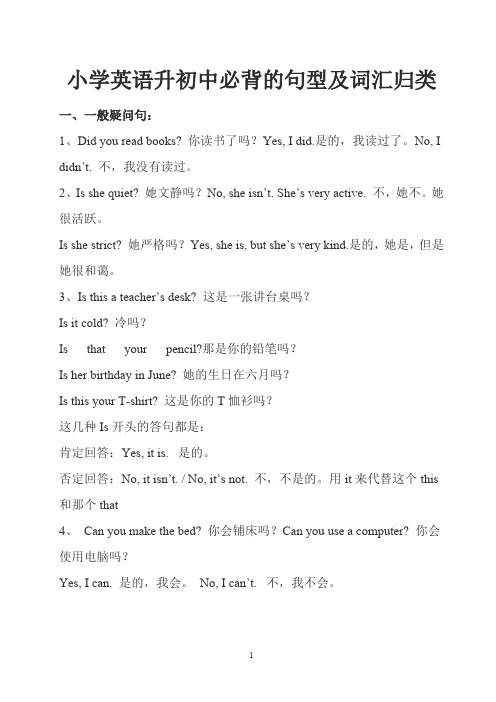
小学英语升初中必背的句型及词汇归类一、一般疑问句:1、Did you read books? 你读书了吗?Yes, I did.是的,我读过了。
No, I didn’t. 不,我没有读过。
2、Is she quiet? 她文静吗?No, she isn’t. She’s very active. 不,她不。
她很活跃。
Is she strict? 她严格吗?Yes, she is, but she’s very kind.是的,她是,但是她很和蔼。
3、Is this a teacher’s desk? 这是一张讲台桌吗?Is it cold? 冷吗?Is that your pencil?那是你的铅笔吗?Is her birthday in June? 她的生日在六月吗?Is this your T-shirt? 这是你的T恤衫吗?这几种Is开头的答句都是:肯定回答:Yes, it is. 是的。
否定回答:No, it isn’t. / No, it’s not. 不,不是的。
用it来代替这个this 和那个that4、Can you make the bed? 你会铺床吗?Can you use a computer? 你会使用电脑吗?Yes, I can. 是的,我会。
No, I can’t. 不,我不会。
5、Are they ducks? 它们是鸭子吗?Are they eating the honey? 它们吃蜂蜜吗?Are those your shoes? 那是你的鞋子吗?Are these your pants? 那是你的裤子吗?这几种句型的回答都是:肯定回答:Yes, they are. 是的,它们是。
否定回答:No, they aren’t. 不,它们不是。
用they来代替这些these和那些those6、Is there a forest in the park? 公园里有一个森林吗?Is there a river?那里有条河吗?Yes, there is. 是的,那里有。
小升初英语常考知识点汇总复习

小升初英语常考知识点汇总复习一、词汇1.介词:- in 在(大、小)、在(年、月、星期)、在(户外活动)- on 在(地图上)、在(表面)、在(大、小)、在(星期和日期)、在(具体场所)- at 在(时刻)、在(大、小)、去(地)- for 为了、给予- with 和谁在一起- to 给予、换- from 来自- of 属于、..的一部分、in the mornig/afternoon/evening- about 关于- on foot 步行2.数词:-数词一般不会单独出现,常与名词搭配使用- 用于询问人数的疑问句: How many + 可数名词复数 + do you have?- 多少用many;几个用a few(可数名词)、a little(不可数名词)- 序数:1st, 2nd, 3rd, 4th...(以th结尾)3.动词:- be动词的三种形式- have的三种形式- 动词的ing形式-祈使句的用法4.名词:- 单数名词变复数的规则:+s, +es, y变i+es-名词所有格的用法5.形容词:- 原级(er)的用法- 比较级(more)的用法- 最高级(most)的用法二、语法1.一般现在时-肯定句、否定句、一般疑问句、特殊疑问句的构成及回答方式2.一般过去时-肯定句、否定句、一般疑问句的构成及回答方式- 常用时间状语:yesterday, last week/month/year, ago3.现在进行时-肯定句、否定句、一般疑问句、特殊疑问句的构成及回答方式- 常用时间状语:now, at the moment, this week/month/year 4.一般将来时-肯定句、否定句、一般疑问句的构成及回答方式- 常用时间状语:tomorrow, next week/month/year5.祈使句-动词原形开头的句子-含义:请求、命令、建议6.特殊疑问句- 特殊疑问词who, what, when, where, why, how的用法-对特殊疑问句的回答7.情态动词- can / can’t- may / may not- must / mustn’t- should / shouldn’t8.语态-被动语态的构成及用法三、阅读理解1.找关键词-定位关键词帮助理解文章-注意定位词的重要性2.标题理解-根据文章内容进行判断-注意段落开始部分的作用四、写作1.简单句的写作-主语+谓语动词+宾语-根据提供的信息进行写作2.描写人物-描述外貌特征、爱好、性格等-句子要表达清楚五、口语1.问候及介绍-问候语及回答-个人信息介绍2.日常用语-表达需求、意愿-赞扬、感谢、道歉-表达喜怒哀乐等情绪。
小升初必考英语知识点总结
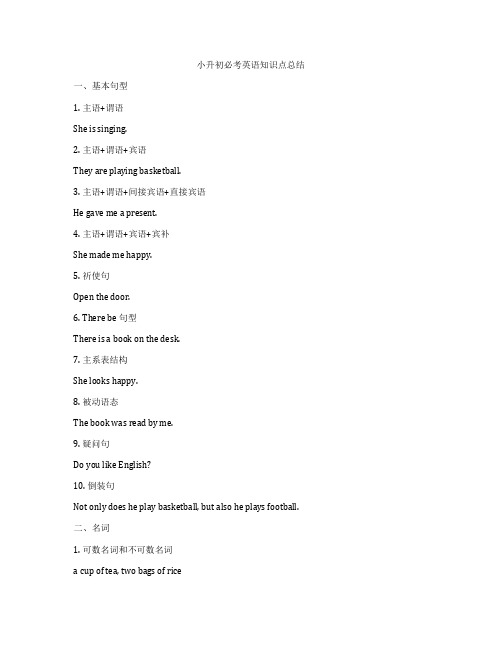
小升初必考英语知识点总结一、基本句型1. 主语+谓语She is singing.2. 主语+谓语+宾语They are playing basketball.3. 主语+谓语+间接宾语+直接宾语He gave me a present.4. 主语+谓语+宾语+宾补She made me happy.5. 祈使句Open the door.6. There be 句型There is a book on the desk.7. 主系表结构She looks happy.8. 被动语态The book was read by me.9. 疑问句Do you like English?10. 倒装句Not only does he play basketball, but also he plays football.二、名词1. 可数名词和不可数名词a cup of tea, two bags of rice2. 名词的所有格my father's car3. 名词的单复数a book, two books4. 特殊名词的复数形式child-children, woman-women5. 特殊名词的不可数名词形式news, information6. 特殊名词的复合名词形式forget-me-not, passer-by三、冠词1. 定冠词和不定冠词a book, the book2. 不加冠词的情况He is a student.3. 特殊用法once upon a time四、代词1. 人称代词I, you, he, she, it, we, they2. 物主代词my, your, his, her, its, our, their3. 反身代词myself, yourself, himself, herself, itself, ourselves, themselves 4. 特殊用法one another, each other五、动词1. 一般现在时He plays basketball every day.2. 一般过去时I played computer games yesterday.3. 一般将来时I will go to the park tomorrow.4. 现在进行时She is reading a book now.5. 过去进行时He was playing basketball at this time yesterday.6. 情态动词can, may, must, should, need7. 动词的不定式to do, to be8. 动词的-ing形式reading, playing9. 动词的完成时I have read that book.10. 动词的被动语态The book was read by me.11. 及物动词和不及物动词I like singing.六、形容词和副词1. 形容词的比较级和最高级big-bigger-biggest2. 副词的用法She sings well.3. 物主形容词my, your, his, her, its, our, their4. 特殊形容词和副词good-better-best, well-better-best七、介词1. in, on, at的用法in the classroom, on the desk, at home2. 特殊介词的用法under, over, between, among3. 介词短语in front of, next to, to the left of4. 介词词组on time, in time八、连词1. and, but, or的用法She likes playing basketball and football.2. because, so的用法He is tired because he works hard.3. 特殊连词的用法either...or, neither...nor, not only...but also...九、数词1. 基数词和序数词one, first2. 特殊数词的用法the first of October, one and a half 3. 特殊用法three times a week, two hours' time十、时间1. 日常时间的表达at seven o'clock, in the morning2. 一般现在时表示的未来情况I leave for Beijing tomorrow.3. 特殊时间状语的用法last Sunday, next Tuesday十一、情态动词1. can, may, must, shouldI can swim.2. 特殊情态动词的用法would like, need3. 特殊用法had better, have to十二、虚拟语气1. if引导的虚拟条件句If I were you, I would go now.2. wish引导的虚拟句I wish I were a bird.3. 特殊用法It's high time, If only十三、疑问句和感叹句1. 一般疑问句Do you like English?2. 特殊疑问句What's your name?3.感叹句What a nice day it is!四、定语和被定语1. 定语的位置和形式the red book, the book on the desk2. 被定语的位置和形式a city of the world, a boy with big eyes3. 特殊用法a cup of tea, the mother of all rivers 十五、主谓一致1. 就近原则Neither she nor I am good at singing.2. 特殊用法There be 句型十六、宾语从句1. 特殊宾语从句的引导词I know who the man is.2. 特殊宾语从句的时态I think he will come soon.十七、主语从句1. 特殊主语从句的引导词What you have said is true.2. 特殊主语从句的时态It's clear that they have won the game. 十八、定语从句1. 特殊定语从句的引导词The boy who is swimming is my friend.2. 特殊定语从句的时态I have lost the pen that you gave me.十九、状语从句1. 时间状语从句When the bell rang, we stopped working.2. 地点状语从句Where there is a will, there is a way.3. 原因状语从句Because he was ill, he didn't go to work.4. 条件状语从句If I were you, I would go now.5. 结果状语从句It's so late that we can't go out.六、语音1. 单词中元音的发音cake, team2. 单词中辅音的发音break, cream3. 单词重读音节的规律beautiful, comfortable4. 特殊音标的发音ai, ee, th七、词汇1. 同义词happy-glad, big-large2. 反义词happy-sad, big-small3. 同音词see-sea, for-four4. 词根act, behave5. 词缀happy-unhappy, Sunday-weekend 8、语法1. 句子成分的转换He doesn't like playing basketball. Playing basketball is not liked by him.2. 句子类型的转换She can swim. - Can she swim?十九、阅读1. 阅读理解阅读短文,回答问题。
小升初英语必背知识点可打印
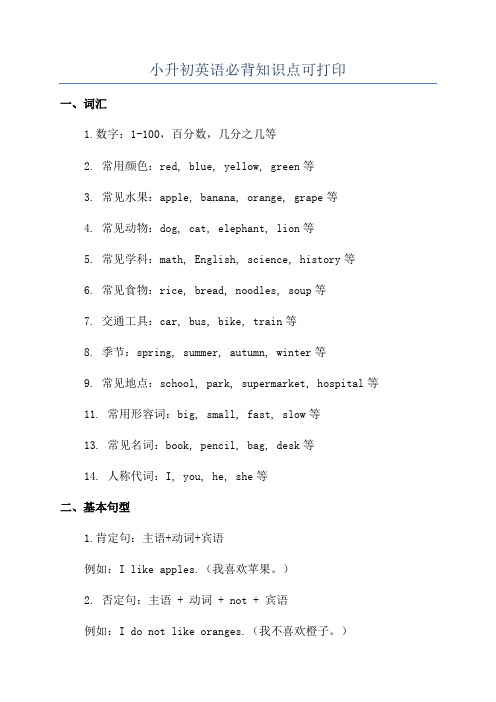
小升初英语必背知识点可打印一、词汇1.数字:1-100,百分数,几分之几等2. 常用颜色:red, blue, yellow, green等3. 常见水果:apple, banana, orange, grape等4. 常见动物:dog, cat, elephant, lion等5. 常见学科:math, English, science, history等6. 常见食物:rice, bread, noodles, soup等7. 交通工具:car, bus, bike, train等8. 季节:spring, summer, autumn, winter等9. 常见地点:school, park, supermarket, hospital等11. 常用形容词:big, small, fast, slow等13. 常见名词:book, pencil, bag, desk等14. 人称代词:I, you, he, she等二、基本句型1.肯定句:主语+动词+宾语例如:I like apples.(我喜欢苹果。
)2. 否定句:主语 + 动词 + not + 宾语例如:I do not like oranges.(我不喜欢橙子。
)3.疑问句:特殊疑问词+助动词/助动词+主语+动词+宾语例如:What do you like?(你喜欢什么?)4.一般疑问句:助动词/助动词+主语+动词+宾语例如:Do you like bananas?(你喜欢香蕉吗?)5. 答语:肯定回答:Yes, 主语 + 动词。
否定回答:No, 主语 + do/does not + 动词。
例如:Yes, I do. / No, I do not.三、时态1. 一般现在时:I/you/we/they + 动词原形,he/she/it + 动词原形 + s/es例如:I like to swim.(我喜欢游泳。
)2.一般过去时:主语+动词过去式例如:They played basketball yesterday.(他们昨天打篮球。
小升初单词、词组、句型、语法大全
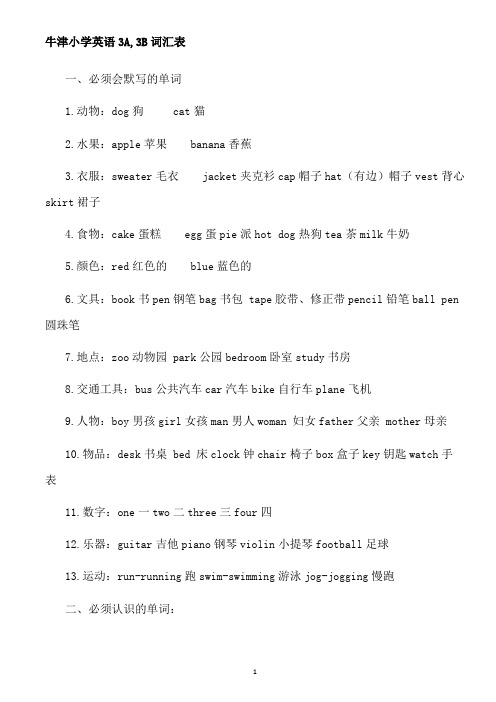
牛津小学英语3A,3B词汇表一、必须会默写的单词1.动物:dog狗 cat猫2.水果:apple苹果 banana香蕉3.衣服:sweater毛衣 jacket夹克衫cap帽子hat(有边)帽子vest背心skirt 裙子4.食物:cake蛋糕 egg蛋pie派hot dog热狗tea茶milk牛奶5.颜色:red红色的 blue蓝色的6.文具:book书pen钢笔bag书包 tape胶带、修正带pencil铅笔ball pen 圆珠笔7.地点:zoo动物园 park公园bedroom卧室study书房8.交通工具:bus公共汽车car汽车bike自行车plane飞机9.人物:boy男孩girl女孩man男人woman 妇女father父亲 mother母亲10.物品:desk书桌 bed 床clock钟chair椅子box盒子key钥匙watch手表11.数字:one一two二three三four四12.乐器:guitar吉他piano钢琴violin小提琴football足球13.运动:run-running跑swim-swimming游泳jog-jogging慢跑二、必须认识的单词:1.家庭成员:grandfather爷爷grandmother奶奶aunt阿姨uncle叔叔brother 兄、弟sister姐、妹son儿子daughter女儿2.文具:storybook故事书copybook抄写本knife小刀crayon蜡笔stapler 订书机3.物品:computer电脑radio收音机camera照相机toy train玩具火车(a toy …)4.数字:five五six六seven七eight八nine九ten十eleven十一twelve 十二 thirteen十三fourteen十四fifteen十五sixteen十六seventeen十七eighteen十八nineteen十九twenty二十twenty-one二十一twenty-two二十二thirty三十forty四十fifty 五十sixty六十seventy七十eighty八十ninety九十ninety-nine九十九5.地点:a dining-room餐厅a kitchen厨房a bathroom卫生间a sitting-room 客厅6.食物:a hamburger汉堡包an ice cream冰淇淋a sandwich三明治some bread 一些面包some rice一些米饭coffee咖啡juice果汁soft drinks软饮料a cup of …一(茶)杯… a glass of …一(玻璃)杯…a bar of chocolate一块巧克力a carton of milk一盒牛奶7.衣服:a coat外套a blouse(女)衬衫a dress连衣裙a shirt(男)衬衫a T-shirt T恤衫a belt皮带shoes鞋子trousers裤子socks袜子a tie领带8.球类:volleyball排球baseball棒球basketball篮球9.乐器:an accordion手风琴10.运动:climb-climbing爬山skate-skating滑冰ski-skiing滑雪rowing 划船fishing钓鱼牛津英语4A、4B词汇——4A词汇表Unit 1 May I have …?四会单词:I我,I’m=I am, yes是,是的a一(个,件…),this这;这个for 给;为you你;你们, pen钢笔,a ball pen圆珠笔,pencil铅笔, book书,May I …?我可以…吗?have 得到三会单词:come in进来Miss女士,小姐(对未婚妇女的称呼),please请, copybook抄写本 ,thank谢谢,sure当然,here这里;这儿,are是,Here you are.给你。
小升初英语必考40个重点知识点
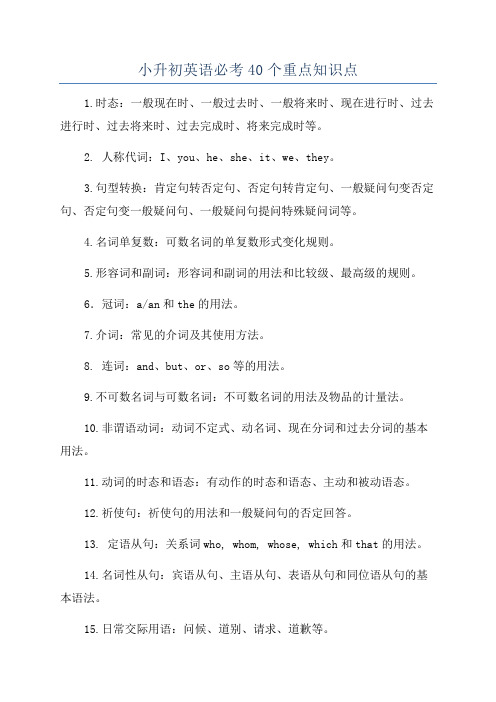
小升初英语必考40个重点知识点1.时态:一般现在时、一般过去时、一般将来时、现在进行时、过去进行时、过去将来时、过去完成时、将来完成时等。
2. 人称代词:I、you、he、she、it、we、they。
3.句型转换:肯定句转否定句、否定句转肯定句、一般疑问句变否定句、否定句变一般疑问句、一般疑问句提问特殊疑问词等。
4.名词单复数:可数名词的单复数形式变化规则。
5.形容词和副词:形容词和副词的用法和比较级、最高级的规则。
6.冠词:a/an和the的用法。
7.介词:常见的介词及其使用方法。
8. 连词:and、but、or、so等的用法。
9.不可数名词与可数名词:不可数名词的用法及物品的计量法。
10.非谓语动词:动词不定式、动名词、现在分词和过去分词的基本用法。
11.动词的时态和语态:有动作的时态和语态、主动和被动语态。
12.祈使句:祈使句的用法和一般疑问句的否定回答。
13. 定语从句:关系词who, whom, whose, which和that的用法。
14.名词性从句:宾语从句、主语从句、表语从句和同位语从句的基本语法。
15.日常交际用语:问候、道别、请求、道歉等。
16.宾语:及物动词后面的宾语和介词后面的宾语。
17.数词:数字和序数词的用法。
18.频率副词:频率副词的位置和用法。
19. 情态动词:can、could、may、might等的用法。
20.反意疑问句:反意疑问句的构成和回答方式。
21.祈使句和陈述句的句型转换。
22.简单句和复合句的句型转换。
23.状语从句:时间、地点、方式等状语从句的用法。
24.英语字母和大小写的用法规则。
25.数字和时间的表达方法。
26.祈使句、感叹句和陈述句的区别。
27.人称代词和形容词性物主代词的用法。
28.祈使句的否定形式的构成和用法。
29.独立主格结构:独立主格结构的基本句型和用法。
30.定语从句和名词性从句的结构和区别。
31.特殊疑问句:特殊疑问句的基本用法和回答方式。
PEP英语小升初知识点归纳

PEP英语小升初知识点归纳(一)短语和词组line up 排列 a long tail 一条长尾巴than you taller 比你高how heavy 多重how long多长how big 多大have a fever 发烧have the flu 患流感a big nose 一个大鼻子have a headache 头痛go to the park 去公园watch TV看电视at night 在夜晚play the piano 弹钢琴play football 踢足球listen to music听音乐go swimming 去游泳wash clothes 洗衣服feel tired 感觉劳累take some medicine 吃药worry about 焦急,担心have a sore throat 喉咙疼have a toothache 牙痛laugh at 因…而发笑eat good food 品尝美食buy present 买礼物take pictures 照相learn Chinese 学汉语folk dance 民族舞folk clothes 民族服装this weekend 这个周末by plane (by air)乘飞机 a taxi driver 出租车司机go skiing去滑雪far from 离….远farewell party欢送会last day of the holiday 假期的最后一天good luck 好运at the museum/airport 在博物馆/飞机场in the future 在将来the end of the school 学年末carrot juice 胡萝卜汁 a book of stamps 一本邮册just a minute 等一会Stone forest 石林Spring city 春城on the moon 在月球funny tongue twisters 有趣的绕口令a few days 几天the deep cold water 在寒冷的深水a pair of 一双theme park 主题公园read a magazine 阅读杂志comic book 漫画书fruit stand 水果摊shoe store鞋店pet shop 宠物商店go to the cinema 去看电影go away 离开go back to school 返回学校go hiking 远足go on a big trip 进行一次长途旅行answer the door 开门answer the phone 接电话answer----answering(现在分词)take off 脱下take a trip 去旅行take---took (过去式) taking(现在分词) takes(单三)do the dishes洗碗碟do morning exercises 晨练do an experiment 做实验did(过去式)do housework 做家务do homework 做作业do—does (单三) doing (现在分词)write a report 写报告write a letter 写信write an e-mail 写电子邮件write a poem 写诗write (writes 单三)(writing现在分词)(wrote 过去式)make a snowman 堆雪人make a kite(make kites) 制作风筝make the bed 整理床铺collect insects 收集昆虫collect stamps 收集邮票collect leaves 收集树叶make sure 确认cook the meals 做饭cook noodles 煮面条catch the ball 接球catch butterflies 捉蝴蝶catch—caught(过去式) catches(单三)交通用语stop at a red light 红灯停wait a yellow light 黄灯等go at a green light 绿灯行by bike 骑自行车on foot 步行by car(take the car)/by subway/ by ship crosswalk人行穿越道No entry禁止通行No bikes自行车禁行One way单行道Turn right 右转No turn left 禁止左转告别语write soon尽快给我回信take care保重have a trip 旅途愉快keep up touch 保持联系see you later 一会见(二)词的用法A.名词复数例:book---books watch—watches baby---babies knife---knives roof--roofs foot---feet man—men goose—geese ox--oxen child—children mouse---mice tomato—tomatoes fish—fish deer—deer Chinese –Chinese Japanese—Japanese woman doctor-----women doctorsB.冠词例:a worker a pen an hour an apple an orange the pictureC.代词例:I(主格)---me(宾格)my(形容词物主代词)-----mine(名词性物主代词) You ----you your ---- yoursHe -----him his ------ hisShe ----her her ------hersWe ---us our ------oursYou ---you your ------yoursThey -- them their -------theirs(注:This is my jacket.(同义句) This jacket is mine.D.数词.基数词one two three four …..序数词first second third fourth fifth eighth ninth twentieth thirty—first(第三十一)F.形容词比较级和最高级例:tall—taller big---bigger heavy—heavier late—later beautiful—more beautiful good/well---better---best(最高级) many/much---more---most(最高级)ill/bad----worse-----worst(最高级) little-------less---------least(最高级)old---older/elder—oldest/eldest(最高级) far—farther/further—farthest/furthest(最高级) 例句:I am taller than your brother. He is shorter than me.(三)英语时态的简单用法A..一般现在时(当主语是单数第三人称时,谓语动词要发生相应的变化,即单三形式)(always usually often sometimes never every day …..这些词出现体现一般现在时)例1.)He always helps others. 他总是帮助别人。
小升初英语重点知识点总结
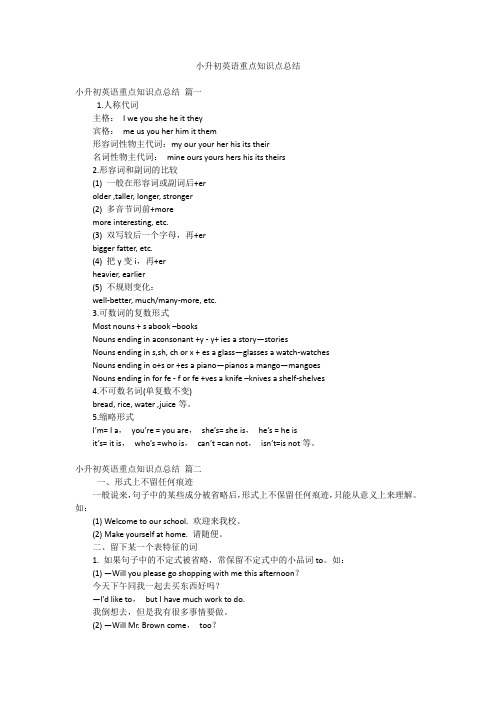
小升初英语重点知识点总结小升初英语重点知识点总结篇一1.人称代词主格:I we you she he it they宾格:me us you her him it them形容词性物主代词:my our your her his its their名词性物主代词:mine ours yours hers his its theirs2.形容词和副词的比较(1) 一般在形容词或副词后+erolder ,taller, longer, stronger(2) 多音节词前+moremore interesting, etc.(3) 双写较后一个字母,再+erbigger fatter, etc.(4) 把y变i,再+erheavier, earlier(5) 不规则变化:well-better, much/many-more, etc.3.可数词的复数形式Most nouns + s abook –booksNouns ending in aconsonant +y - y+ ies a story—storiesNouns ending in s,sh, ch or x + es a glass—glasses a watch-watchesNouns ending in o+s or +es a piano—pianos a mango—mangoesNouns ending in for fe - f or fe +ves a knife –knives a shelf-shelves4.不可数名词(单复数不变)bread, rice, water ,juice等。
5.缩略形式I’m= I a,you’re = you are,she’s= she is,he’s = he isit’s= it is,who’s =who is,can’t =can not,isn’t=is not等。
小升初英语重点知识点总结篇二一、形式上不留任何痕迹一般说来,句子中的某些成分被省略后,形式上不保留任何痕迹,只能从意义上来理解。
- 1、下载文档前请自行甄别文档内容的完整性,平台不提供额外的编辑、内容补充、找答案等附加服务。
- 2、"仅部分预览"的文档,不可在线预览部分如存在完整性等问题,可反馈申请退款(可完整预览的文档不适用该条件!)。
- 3、如文档侵犯您的权益,请联系客服反馈,我们会尽快为您处理(人工客服工作时间:9:00-18:30)。
2018年小升初英语短语词汇go to the park 去公园climb trees 爬树Be quiet 保持安静Do not touch 不要摸No eating and drinking 禁止吃喝keep off the grass 不践踏草坪No parking 禁止停车No littering 禁止扔杂物from Japan 来自日本No smoking 禁止吸烟at once 立刻,马上his family 他的家人in a week 在一周内feel ill 感觉病了eight subjects 八门课eight lessons 八节课welcome back to school 欢迎回到学校what subjects 什么科目her students 她的学生the first lesson 第一节课wrong number 打错电话on Monday morning 在星期一上午a new term 新学期Monday morning 星期一上午open your mouth 张开你的嘴go to see a doctor 去看医生open your mouth 去看医生have a good rest 好好休息a bad cough 严重的咳嗽take some medicine 吃药after lunch 午饭以后stay in bed 呆在床上the same hobby 相同的爱好a telephone call 一次电话通话in the garden 在花园里water the flowers 浇花animal stamps 动物邮票cook food 做饭show…to… 出示…给…看grow flowers 种花Ben’s hobbyBen 的爱好some hobbies 一些爱好make clothes 做衣服wash clothes 洗衣服collect Chinese stamps 收集中国邮票many beautiful stamps 许多漂亮的邮票go shopping 购物collect stamps 收集邮票dance beautifully 跳舞跳得美take photos 拍照2018小升初小学英语高频重点句型【1-5】1、as…as 和……一样中间必须用形容词或副词原级。
例如:This classroom is as big as that one. 这间教室和那间一样大。
He runs as fast as Tom. 他和汤姆跑的一样快。
否定结构:not as/so…as,“不如……”上面的两个句子可分别改为:This classroom is not as/so large as that one.这间教室不如那间大。
He doesn‘t run as/so fast as Tom.他跑得不如汤姆快。
2、as soon as 一……就…… 用来引导时间状语从句。
若主句是一般将来时,从句要用一般现在时。
例如:I’ll tell him the plan as soon as I see him.我一看到他就告诉他这个计划。
He‘ll go home as soon as he finishes his work.他一完成工作就回家。
3、be busy/enjoy/hate/go on/finish doing sth. 忙于/喜欢/讨厌/ 继续/完成做某事在enjoy, finish, hate, go on, be busy 等词语后,一般用动词-ing 形式作宾语。
例如:Lin Tao is busy making a model plane.林涛正忙着做飞机模型。
My mother enjoys taking a walk after supper.我妈妈喜欢晚饭后散步。
I hate watching Channel Five.我讨厌看五频道。
When someone asked him to have a rest, he just went on working.当有人让他休息一会儿时,他仍继续工作。
I have finished writing the story. 我已经写完了故事。
4、fill…with 用……装满......;be filled with充满了……;be full of 充满了......①be filled with 说明由外界事物造成的此种状态,表示被动。
例如:The box is filled with food.盒子里装满了食物。
②be full of 说明主语处于的状态。
此外,还可表示程度,意为“非常”。
例如:The patient‘s room is full of flowers. 那个病人的房间摆满了花。
The young man is full of pride. 那个年轻人非常骄傲。
③这两种结构还可以相互改写。
例如:I fill the box with food. The box is full of food.5、be good/bad for 有利于/有害于……此句型是:be+adj.+for+n.结构。
例如:Doing morning exercises is good for your health.做早操对你的健康有益。
Always playing computer games is bad for your study.总玩电脑游戏对你的学习不利。
6、be used to(doing) sth. 习惯于…… 后必须接名词或动名词,可用于现在、过去、将来的多种时态be 可用get,become 来代替。
例如:He is used to life in the country.(He is used to living in the country.) 他习惯于乡村生活。
He will get used to getting up early. 他将会习惯于早起。
注意:be used to do 的意思是“被用来做……”。
例如: Wood is used to make paper. 木材被用来造纸。
7、both…and…两者都…… 用来连接两个并列成分;当连接两个并列主语时,其后谓语动词用复数。
例如:Both the students and the teachers will go to the History Museum tomorrow. 不论老师还是学生明天都会去历史博物馆。
8、can‘t help doing sth. 禁不住做某事help 在此的意思是“抑制,忍住”,其后接动词-ing 形式。
例如:His joke is too funny. We can’t help laughing. 他的笑话太有趣了,我们禁不止笑了起来。
9、sth. costs sb. some money 某物花费某人多少钱此句型的主语是物。
cost一词带的是双宾语,它的过去式、过去分词和原型一样。
This book cost me five yuan. 这本书花了我五元钱。
10、either…or… 不是……就是……,或者……或者……用来连接两个并列成分,当连接并列主语时,谓语动词与邻近的主语保持一致。
You may either stay here or go home.你可以呆在这儿,也可以回家。
Either she or I am right. = Either I or she is right.不是她对就是我对。
11、enough (for sb.) to do sth. 足够……做……在此结构中,for 用来引出不定式的逻辑主语。
例如:The ice isn‘t thick enough for you to walk on.这冰还没有厚到你可以在上面走的程度。
12、feel like doing sth. 想要做……此处 like 为介词,后面跟动词-ing 形式。
此句型与 would like to do sth.同义。
例如:I feel like drinking a cup of milk. 我想喝一杯牛奶。
13、feel/find/think it adj./n. to do sth. 认为某事……在此结构中 it 为形式宾语,不定式短语作真正的宾语例如:I find it very interesting to play football.我发现踢足球很有趣。
She thinks it her duty to help us.她认为帮助我们是她的职责。
14、get ready for sth./ to do sth.get ready for sth.意为“为某事做准备”get ready to do sth.意为“准备做某事”例如:We are getting ready for the meeting.我们正在为会议做准备。
They were getting ready to have a sports meet at that moment. 他们那时正准备开运动会。
15、get/receive/have a letter from 收到……的来信,相当于 hear from例如:Did you receive a letter from John?你收到约翰的来信了吗?I got a letter from my brother yesterday.我昨天收到了我弟弟的一封来信。
2018小升初英语高频重点句型【6-10】16、had better (not) do sth. (别)做某事had better 为情态动词,其后需用动词原形。
had better 常用缩写,变成‘d better,其否定形式是在其后直接加 not。
例如:We had better go now. = We’d better go now.我们现在走吧。
You‘d better not go out because it is windy.今天刮风,你别出去了。
17、have sth. done 使(某事)完成 (动作由别人完成)sth.为宾语,done 为过去分词作补语。
例如:We had the machine repaired.我们请人把机器修好了。
注意区分:We have repaired the machine.我们(自己)已经修好了机器。
18、help sb. (to) do sth./with sth. 帮助某人(做)某事其中的 to 可以省略。
例如:I often help my mother with housework.我常常帮助妈妈做家务。
